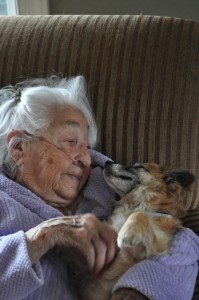 I was my elderly Mom, Gertie’s, caregiver for the last 5 years of her life so I accompanied her to all of her doctor visits. I had my reasons for tagging along (actually, she mostly tagged along!) to her doctor visits, and I’ll document them below. I also figured out a few efficiencies over those years, and I’ll share those also. My efficiencies didn’t only cut down the time we spent bringing new doctors up to speed, but they also ensured that the information we shared was complete and the same for all doctors.
I was my elderly Mom, Gertie’s, caregiver for the last 5 years of her life so I accompanied her to all of her doctor visits. I had my reasons for tagging along (actually, she mostly tagged along!) to her doctor visits, and I’ll document them below. I also figured out a few efficiencies over those years, and I’ll share those also. My efficiencies didn’t only cut down the time we spent bringing new doctors up to speed, but they also ensured that the information we shared was complete and the same for all doctors.
ALWAYS accompany the elderly to doctor visits
My Mom didn’t drive when she came to live with me full-time after Dad died – good thing as she was 91! So, it was a no-brainer that I would be taking her to all of her doctor visits.
Now, I was in more than one doctor waiting room where I saw paid caregivers taking their charges to the visit, but I’m a firm believer that a family member should always be present. Caregivers may not pay the same amount of attention to the questions being asked and answered and may not be able to even answer them all. And, even if they do a decent job at the doctor visit, there’s no guarantee they’ll relate all of the information back to you. So, even if it is a hardship, please make sure a family member accompanies your loved one to the doctor.
Also, make sure to take along all pertinent insurance information. I used to keep Mom’s in a small wallet and it was the first thing to go into my tote bag on every doctor visit.
Invest In A Good Tote Bag To Carry To Doctor Visits and Hospitalizations
Particularly when visiting a doctor for the elderly, you might find yourself and your loved one waiting a long time in the doctor’s waiting room as the doctor has to prioritize. After all, if it was your Mom in dire need, you’d want her moved to the front of the line, right?
I got pretty good at stocking items in my large tote bag to keep Mom and me entertained during these time. I stocked up on things like puzzle books, granola bars, large print playing cards, and bottles of water.
Here’s some nice tote bags on the market. Note: I have that Anushka tote bag and love the thing. I get all kinds of compliments on it. The picture doesn’t do it justice. Whatever tote bag you select, make sure your computer and other items will all fit within it.
Anuschka 430 Double Entry Shopper,Premium Peacock Safari,one sizeCheck PriceReisenthel Market Basket, Black/White FloraCheck PriceBlue Q – Moon Garden Shoulder ToteCheck PriceReisenthel Baroque Ruby Loop Shopper Tote BagCheck Price
When accompanying a senior citizen to a doctor’s visit, try to get the first appointment of the day
As I mentioned earlier, doctors specializing in geriatrics may well fall behind in their scheduling due to prioritizes. It is for this reason that I suggest you get the first appointment of the day. This didn’t work so well for me as my Mom was not an early bird (that’s putting it nicely). What I figured out instead was that, if we couldn’t get to the doctor early in the morning, the next best doctor appointment time slot was during the afternoon, right after lunch.
Create a written medical history documenting your senior citizen’s past and present health conditions
I can’t tell you how many times I had to repeat my Mom’s medical history, sometimes to the same doctor on separate visits. How frustrating! So, I got smart – I created a word document with dates of surgeries, hospitalizations, etc and simply handed a copy over.
I always made sure to keep copies of Mom’s medical history in the car, just in case, and also reviewed and updated my Mom’s medical history every time we got a new diagnosis. Not only was her medical history spot on every time, but I also wasn’t wracking my caregiver’s brain (which was frequently lacking sleep) to try and remember everything. Invariably, I would have left something out.
I would suggest sending a copy of the medical history you create to close relatives so that they have your senior citizen’s up-to-date medical history in case they needed it. The doctors were always happy to receive the paper and, on more than one occasion, they were amused. Eh, it’s better to be prepared.
Note: I kept Mom’s medications on business cards in my wallet. More on that later.
Things to include when creating a senior citizen’s medical history
Here’s some ideas to get you started creating a medical history for your favorite senior citizen.
- Note any surgeries. If you have a date, even a year helps, note it down for each surgery. And, if you can, document the doctor’s name and phone number who performed the surgery.
- Note any hospitalizations. Document the dates of the hospitalization, the diagnosis and prognosis (if there was one) and the name of the hospital.
- Note family medical history. Your favorite senior citizen’s family history can sometimes give a doctor a clue as to where to look for a diagnosis. For example, if there is a strong history of breast cancer in your loved one’s family and she has a lump, less time will be wasted before a biopsy is done.
- Note immunizations. Make sure to update your senior citizen’s medical history with any immunizations, especially flu shots and pneumonia shots. Note: Pneumonia shots only have to be given every 5 years.
- History of allergies or adverse reactions to certain drugs.
Document Medications On Business Cards
Similarly to the medical history, doctor’s always want to know what medications your favorite senior citizen is on, what milligram, how often they take it, etc. You’re playing with danger if you just tote a bag of bottles around with you as, 1) you can lose them (yes, it happens) or 2) the medicine bottles may open and you’re in a real mess (yes, it happens). So, here’s what I did to ensure I was armed for bear when a doctor asked me about medications:
to the medical history, doctor’s always want to know what medications your favorite senior citizen is on, what milligram, how often they take it, etc. You’re playing with danger if you just tote a bag of bottles around with you as, 1) you can lose them (yes, it happens) or 2) the medicine bottles may open and you’re in a real mess (yes, it happens). So, here’s what I did to ensure I was armed for bear when a doctor asked me about medications:
I prepared a computer listing and formatted it for a business card which I kept in my wallet. On the front, I had my Mom’s name and the name and milligram of each medication. On the back, I have ‘morning, noon, dinner, nighttime’ as headings and listed each medication under the appropriate heading. That way, not only did the doctor have a complete listing of my favorite senior citizen’s meds, but he or she knew exactly what time of day they were given. I thought I was fairly brilliant for coming up with this idea!
I also was certain to always revise the business cards (and throw the old ones out) each time a medication was prescribed or deleted from my Mom’s regimen. And, I made sure to have at least 2 or 3 of her medication cards on me at all times as I always would leave one with the doctor to keep in Mom’s file.
ALWAYS stay overnight with your senior loved one during hospitalizations
My Mom had only been in the hospital 4 times in her life prior to 92 years of age – and that was when she gave birth to her children. So, we were neophytes at this hospital stuff when she was diagnosed with pneumonia.
Subsequently, at 95 years of age, Mom broke her hip and off we went again – this time for a lengthier hospital stay. During that hospitalization, I stayed with her 24/7 – well, mostly. We had an excellent paid caregiver, Carina, who I could trust 100% to care for Mom on the occasions when I could run home, take a fast nap and a faster shower and get back to the hospital.
I slept on the cot in the hospital room right next to Mom for the 2 weeks she was hospitalized, and I monitored her throughout the night. The hospital staff loved me. On morning, as I was tidying Mom up, the doctor came in to make rounds and told me something I will never forget – he said ‘Don’t ever leave the elderly in a hospital room alone.’ When I questioned him about that, he mentioned that your elderly loved one will not necessarily receive the same amount of care and attention if someone is not in the room with them. And, in fact, I saw this many times when my Mom’s roommates needed something late at night.
I was frequently at the nurses’ station reporting a beeping from a monitor coming off – in fact, I got to the point that I could just put the monitor back on whomever and reset the machine. Also, the hospital nursing staff is greatly reduced at night – there were times when there was one nurse monitoring 25 hospitalized senior citizens. They just don’t have the time to devote to your loved one like you do.
So, although those hospital ‘lounge chairs’ (and I use that term loosely) are not comfortable, stay there overnight! Note: ask for a comfortable chair – the nurses were so glad to see me staying overnight that they went out of their way to get me the nicest lounge chair on the floor.
In closing, Dr visits and hospitalizations are vitally important to the health and well being of your senior citizen friend. Be prepared and try to stay sane….

Leave a Reply